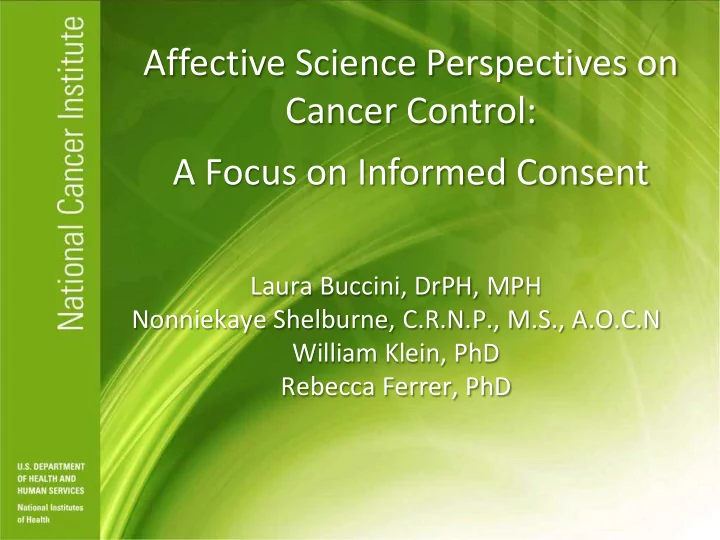

Affective Science Perspectives on Cancer Control: A Focus on Informed Consent Laura Buccini, DrPH, MPH Nonniekaye Shelburne, C.R.N.P., M.S., A.O.C.N William Klein, PhD Rebecca Ferrer, PhD
Outline • Enrollment Cancer Clinical Trials • Cancer Clinical Trials – Consent – Decision Making • Pediatric Cancer Clinical Trials – Consent/Assent – Decision Making • Challenges • Potential Emotional and Cognitive Outcomes • Managing Challenges • Looking Forward 2
Enrollment Cancer Clinical Trials • Adolescents – 10% of 15-to-19 year old adolescent cancer patients are entered into trials, compared to 60% of those under the age of 15 1,2 • Adults – average rate of accrual is between 1 -5%, with cancer patients aged 20 to 29 having the lowest rate of participation of all age groups 1 • Elderly – 61% of new cancer cases occurred among the elderly in 2003, but only 25% of participants in national cancer clinical trials were over 65 years of age 3 – in Phase II and III clinical trials, the elderly carried 60% of the disease burden but represented only 32% of enrolled patients 3 3
Enrollment Cancer Clinical Trials • Racial/Ethnic Groups – nationally, enrollment in cancer clinical trials is disproportionately low among African Americans/blacks and Hispanics/Latinos 4,5 • Rural – among 24,332 patients enrolled in NCI sponsored cancer clinical trials over a one-year period, investigators found marked regional and state variations in patient accrual, suburban geographic areas had the highest overall accrual 6 • Women – an investigation of nonsurgical NCI cancer trial demonstrated that women were less likely than men to be enrolled in colorectal and lung cancer trials 4 4
Informed Consent • Goal: Provide individuals with sufficient information so they can make informed decisions about whether to begin or continue participation in research (clinical care) • Informed consent (IC) is a dynamic process • IC document is simply a starting point 5
Informed Consent • Acknowledges the rights of patients to participate voluntarily in a research study • Requires adequate disclosure of information to patients/participants regarding a proposed intervention • Dominant guiding ethical principle – adults: respect for persons (autonomy) – pediatrics: best interests of child (beneficence) 6
Decision Making • Provide information relevant to making a meaningful decision whether or not to participate (or continue participating) • Takes place in the absence of coercion or duress • Is competent to make decision (surrogate decision maker) • Has decision-making capacity needed to make a meaningful choice about whether or not to participate in the study 7
Balance Act Benefit Risk Benefit Risk 8
Informed Consent/Assent in Pediatrics Triadic Model • Parental permission and patient Child assent (depending on age) • Trusting and “close” relationship between research Trust st staff, the parents and the child Closen enes ess are of crucial importance and have been shown to be the major factors for parents agreeing to a clinical study Parents Investigator 9
Pediatric Decision Making Infants/Young Child No significant decision-making capacity Not able to provide consent Primary School Unable to fully understand implications Assent sought Adolescents Assess ability to weigh potential Some may participate in decision making risks/benefits Own body Personhood Moral agent Control 10
Challenges: Informed Consent/Decision Making The Physician/Investigator The Patient • Communication • Language/linguistic differences and literacy • Lack of minority investigators/ cultural competence • Public attitude/opinion • Persuasion or coercion • Logistics and psychosocial barriers Specific to Pediatrics The Consent Document • Determining child's decision • Long and complex making capacity • Readability and comprehension • Relational dynamics (parent/child) • Dependant on IC documents to • Child’s refusal to participate communicate study information (dissent) against parents wishes 11
Potential Outcomes Emotional Overload Informed Consent & Decision Making Clinical Trial Confused Fear/anxiety Unable to process Shock Unable to Sadness / understand depression Unknowns Anger Need for decision Denial making support Guilt Anticipated Emotion Study withdrawal Incidental Emotion 12
Potential Outcomes Cognitive Overload Informed Consent & Clinical Trial Decision Making Treatment Risks/Benefits choices Standard vs. Family trial concerns Financial Confidentiality worries Randomized Employment concerns Study withdrawal Anticipated Emotion Incidental Emotion 13
Managing Challenges Information Flow Resources • Multimedia • Payment/ interventions reimbursement • Corrected feedback • Social work • Multiple learning • Psychological trials services • Organized /simple • Access to care consent forms • Potential enhanced • Decision aids quality of care 14
Research Initiatives Looking Forward • How can emotion theory and research inform our understanding of the informed consent process and patient decision making in cancer research? – How/to what extent might incidental and anticipated emotions impact patients’ understanding and influence informed decision making? – How might emotional interactions between physicians, patients, patient-parents and family/companions influences patients’ decision making process? – What emotional states inhibit decision making capacity– interventions? 15
References 1 . National Cancer Institute. Facts and Figures About Clinical Trials. from http://www.cancer.gov/clinicaltrials/facts-andfigures#patients. 2. Newburger PE, Elfenbein DS, Boxer LA. Adolescents with cancer: access to clinical trials and age-appropriate care. Current Opinion in Pediatrics. 2002. 14(1):1-4. 3. Lewis JH, Kilgore ML, Goldman DP, et al. Participation of patients 65 years of age or older in cancer clinical trials. Journal of Clinical Oncology. 2003. 21(7):1383- 1389. 4. Du W, Gadgeel SM, Simon MS. Predictors of Enrollment in Lung Cancer Clinical Trials. Cancer. Cancer. 2006.106(2):420-5. 5. Stewart JH, Bertoni AG, Staten JL, Levine EA, Gross CP. Participation in surgical oncology clinical trials: gender-, race/ethnicity-, and age-based disparities. Ann Surg. Oncol. 2007.14(12):3328-34. 6. Sateren WB, Trimble EL, Abrams J, et al. How sociodemographics, presence of oncology specialists, and hospital cancer programs affect accrual to cancer 16 treatment trials. Journal of Clinical Oncology. 2002. 20(8):2109-17.
Recommend
More recommend